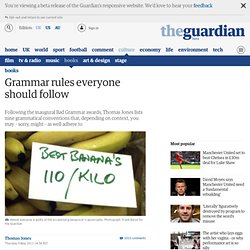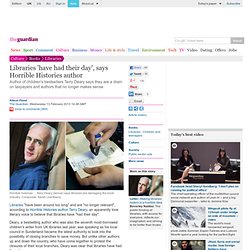

JD Salinger's secret life exposed in new documentary. JK Rowling on the first Harry Potter, Hilary Mantel on Wolf Hall: glimpse authors' musings on their first editions. Grammar rules everyone should follow. The Idler Academy's inaugural Bad Grammar award was bestowed last week on 100 academics who wrote an open letter to Michael Gove in March criticising the education secretary's revised national curriculum.

The letter reads at times as if it was written by committee, but does it really display "the worst use of English over the last 12 months by people who should know better"? Hardly. Like many such gongs, up to and including the Nobel prize for literature, the Bad Grammar award looks suspiciously like the continuation of politics by other means. One of the three judges was Toby Young, whose latest book is How to Set Up a Free School; Gove apparently told fellow guests at a Spectator party last year that he'd like Young to stand as a Tory MP.
"The 100 educators have inadvertently made an argument for precisely the sort of formal education the letter is opposing," Young said. 1. 2. 3. 4. Whom is on the way out, and won't be much missed. 5. 6. 7. 8. 9. 10 popular myths debunked. 'The benefits bill is spent on unemployed and disabled people'

Classics of nature writing and rural life. Holloway - Caught by the River. Robert Macfarlane gives us the background to, Holloway, his collaboration with the artist Stanley Donwood and the writer Dan Richards: Eight years ago this July, I drove down to Dorset with my friend Roger Deakin, to explore the holloways of the area around Chideock.

Holloways – the word comes from the Anglo-Saxon hol weg, hollow way – are paths that, over centuries of use, have sunk down into the landscape through which they run, worn into the earth by footfall, wheel-roll and rain-rush. Some of them are twenty feet deep and steep-sided: more ravine than road. Many have been overgrown by the trees that border them, so that they’ve become green-roofed tunnels. They’re too deep to fill in and farm, and often too narrow to take vehicles, so holloways are often wild places: filled with brambles, nettles, ferns, bees, badgers, ivy and history.
I N T H E H O L L O W A Y. There has been a sort of quiet excitement surrounding the publication of the Faber & Faber edition of Holloway.

Demand was unaccountably high; Faber had to reprint the book four times before publication date because of pre-orders from bookshops, and the other week the book made it into the Sunday Times top ten hardback releases, which was both gratifying and hugely unexpected. It is, after all, a book about a hedge. Right, anyway, I forgot to mention that Caught By The River are selling prints of the five pictures I drew for the book. Going to Ground: Britain’s Holloways. The hidden, wild world of the holloway by Robert Macfarlane Photo: John Beatty.

The Natural History of Selborne. Graphic story: The River of Lost Souls by Isabel Greenberg.
I'll tell you what's wrong with Wetherspoon's - it's run by a man named Tim. I once asked Martin Amis how an interview had gone with a particular journalist and he thought for a moment before shrug-sneering, “Well, y’know, he was a Tim.”

Sharon Gosling's top 10 children's steampunk books. "The definition of what actually qualifies as steampunk is a debate that continues to rumble on, as does the question of why it has become so widely popular in the past few years.

For me, steampunk is the plucky adventurousness of Victorian sensibilities re-imagined with extra, fantastical machinery. It's an attempt to see what would have happened if that era could have been even more plucky and adventurous than it already was. As for why it's become so popular, my feeling is that, at heart, we are all explorers. Yet there is little left of our own planet to explore now and no longer even the need to physically go out and find what is there in order to see it.
Steampunk presents us with a new age of exploration and children are the greatest explorers of them all. Sharon Gosling started her career in magazine journalism and went on to write successful tie-in books for popular television shows such as Stargate and Battlestar Galactica. Hilary Mantel: why novelists are deliberately misunderstood. My late grandfather John Junor was a very successful middle-market newspaper editor.

He ran the Sunday Express for three decades and he used to be very firm on one subject. "I will not," he insisted, "have irony in this newspaper. " Hilary Mantel: bring up the royal bodies. There is a generous explanation of yesterday's sudden furore about what Hilary Mantel said about the Duchess of Cambridge – a brief medialand frenzy into which both David Cameron and Ed Miliband foolishly allowed themselves to be drawn – and then there is the one that is probably true.

The generous explanation is that this is half-term. The rich and powerful are on trade missions to India and ski breaks in the Alps. It is therefore a bit of a slow news week, with the press scraping around for things to write about. Libraries 'have had their day', says Horrible Histories author. Horrible historian ...

Terry Deary (above) says libraries are damaging the book industry. Composite: Sarah Lee/Alamy Libraries "have been around too long" and are "no longer relevant", according to Horrible Histories author Terry Deary, an apparently lone literary voice to believe that libraries have "had their day". TheNewerYork Press. Looking at Charles Dickens from a New Perspective. English literature's 50 key moments from Marlowe to JK Rowling. BBC Radio Three is currently broadcasting a fascinating series on the "50 key works" of classical music. The Sturm und Drang moralism of Lynd Ward's amazing Six Novels in Woodcuts.
Call me crazy. Flipping through the first wordless novel published in America, Gods' Man by Lynd Ward, which came out the week of the Great Crash of 1929, I kept thinking about Moby-Dick, one of the wordiest novels ever, illustrated the next year by Rockwell Kent. Yes, Gods' Man is Moby-Dick without the text, the subtleties, or the whaling, if you can picture that—a silent moral tale of a man warring with his soul.
Told in 139 wood engravings, Gods' Man opens with a small, tempest-tossed skiff. The waves seem to talk or at least gesticulate. Timbuktu library is treasure house of centuries of Malian history. Timbuktu's main library, officially called the Ahmed Baba Institute of Higher Islamic Studies and Research, is a treasure house containing more than 20,000 manuscripts covering centuries of Mali's history. Named after the famous medieval writer and scholar, the manuscripts are housed in a purpose-built 4,600 sq metre (50,000 sq ft) complex completed in 2009 at a cost of around £5m. Designed by South African architects and replacing a crumbling 40-year-old building, the new institute features air conditioning to preserve the manuscripts and an automatic fire-fighting system.
Pranks, etc. British Hell's Angel and Skinhead novels of the 1970s. GENDER, SEXUALITY AND CONTROL Richard Allen, Mick Norman & Other New English Library Youthspoitation Novelists of the 1970s 'Tom grinned, bringing his fist down with a chopping motion on the back of the United fan's neck. He felt the blow jar his muscles. He kicked as the man slumped. Then the boots went in hard. The Richard Allen Project. Proper Magazine — The Colony Room Club 1948 -2008. Timeline Photos. LulzLit.